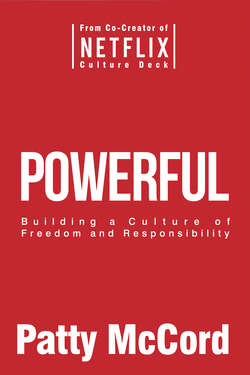Читать книгу Powerful - Patty McCord - Страница 18
На сайте Литреса книга снята с продажи.
Everyone Working for You, at All Levels, Can Understand Your Business
ОглавлениеI expect you’ve had the experience of talking to someone on your team about a business issue and being asked a question that makes you think, This person is clueless! Well, next time it happens, I want you to say to yourself, Wait, right, this person is clueless. He doesn’t know what I know. So I have to inform him.
When I would talk with a team leader at Netflix about a team member who needed more help understanding a problem— which, given the fast-moving and technical nature of so much of the business, happened regularly—sometimes I’d get pushback. They’d say something like “I tried to explain it to him but he’s too stupid to listen.” My answer was always “Well, then you made it too complicated to understand.” The rule I would give them was this: explain it as though you’re explaining to your mother. This was because often through the years, when I’d talk to my mom about some HR initiative I was spearheading, speaking fluent HR gobbledygook, she’d say to me, “Honey, that just sounds stupid.” She was always right.
Coming up with simple yet robust ways to explain every aspect of the business isn’t easy, but it pays huge rewards. To drive this home when I consult, I often ask managers of companies with a customer service group, “How much do you think your customer service representatives understand about how your business works? Do they appreciate the most pressing issues facing the business? How much do you think they know about how their work contributes to the bottom line— and I mean really know, meaning the numbers?”
Now, how often do you think companies drop the ball when it comes to customer service, despite all the talk about improving the customer experience? The research offers a wealth of appalling data. Reportedly 78 percent of consumers have failed to complete a purchase or other transaction because of a poor service experience, and the costs to businesses in the United States have been estimated at $62 billion annually. Research also shows that word of bad customer experiences spreads to twice as many people as that of good experiences. This is a problem that must still by and large be solved by people. Despite attempts to offer customer service through computer bots or preprogrammed FAQs or messaging systems, face-to-face or voice-to-voice service is far and away most effective.
Any company with a customer service organization wants those people to be highly engaged, and the first step is to teach them how to read the company’s P&L. Of course, generally they are the last people the P&L would be shown to. After all, most of them don’t stay long, right? They’re the lowest on the totem pole. Yet all business success is fundamentally driven by word-of-mouth marketing, and the people who are in direct contact with customers must understand that their every interaction with a customer leads to that person telling another person, for free, either to use the company’s product or service or not to. Everyone in customer service, from day one, should understand exactly how the experience they provide customers directly impacts the bottom line. Making that clear isn’t difficult. Every company has calculated its cost of customer acquisition, and each person who becomes a customer on another customer’s recommendation saves the company that amount of money. Every company can share that information with service representatives as part of bringing them on board.
When I give this advice about sharing business details, I sometimes get the response that only smart people can understand this information and only smart people want it. I find that there’s a bias among executives that this is “MBA stuff” and that “those people” wouldn’t be interested or couldn’t get it. My answer: then don’t hire people who are that stupid. Better yet, don’t assume that people are stupid. Assume instead that if they are doing stupid things, they are either uninformed or misinformed.
But surely employees need to be at a higher level before they’re told so much about the down and dirty of the business, no? What if the department is in trouble? What if the company is struggling to build a market for a big new product? Won’t they be freaked out? And can they really be trusted with so much information? Of course, some information must be kept private, but you can absolutely convey the intensity of the competition you’re up against and share the major challenges being faced.
It’s ironic how little information about strategy, operations, and results is generally shared with employees throughout companies. After all, public companies share that information with the whole world these days. Why should the investors on earnings calls know more about what’s happening in your business than most of the people working in it? I think it would be great if companies held the equivalent of an earnings call for all employees. In fact, why not have them listen to the actual earnings calls?
If your people aren’t informed by you, there’s a good chance they’ll be misinformed by others. If you don’t tell them about how the business is doing, what your strategy is, the challenges you’re facing, and what market analysts think of how you’re doing, then they will get that information elsewhere—either from colleagues, who will often be equally ill informed, or from the Web, which loves nothing so much as a rumor of doom or a juicy conspiracy theory.
